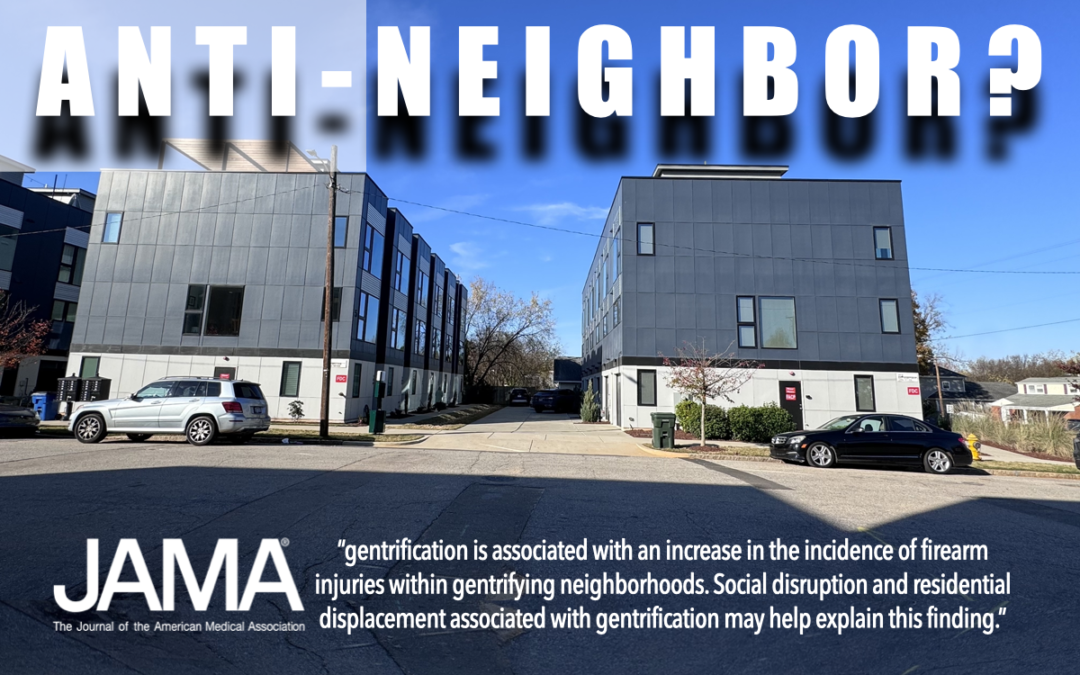
Frank Hielema is a native of Oxford, NC. He holds an undergraduate degree in physical therapy, and his PhD in epidemiology from UNC, Chapel Hill. His areas of focus in epidemiology have been health services research and injuries. He has lived in his present home in Raleigh for 31 years.
Frank spoke at City Council on December 12, 2023. He had planned a 3 minute comment. But, due to the abrupt change by Mayor Baldwin limiting speaker time to only 1 minute, he had to change his comment. We are publishing his originally planned comments here:
With Z-92-22, and the city-initiated upzoning of 744 parcels of land along the New Bern Avenue corridor, our city proposes that we embark on incentivized gentrification of neighborhoods which have historically been home to Raleigh’s most economically vulnerable citizens.
But, beware!
A study published this September in the prestigious journal JAMA Surgery, by Molly Jarman, who earned her PhD from Johns Hopkins and is now affiliated with Harvard warns caution. In evaluating nearly 60,000 US census tracts, Dr. Jarman and her team identified 24% of these tracts which were undergoing gentrification between 2010 and 2019. The researchers also collected geographical firearm injury data from the Gun Violence Archive between 2014 and 2019. You can read about the study in The Guardian here: Gun violence higher in gentrified neighborhoods
They divided census tracts into three groups:
- Low-income, but not gentrifying,
- Low-income and gentrifying, and
- High-income.
The study found that in neighborhoods that became gentrified during the study period, that the incidence of gunshot injuries was 62% higher than in non-gentrifying neighborhoods. In neighborhoods that were actively undergoing gentrification, the increase in firearms injuries was a further 26% higher, equaling 88% higher than in non-gentrifying neighborhoods.
The study did not distinguish between whether the excess gunshot injuries were due to citizen or police fired weapons, or both.
Dr. Jarman explained that the social disruption and residential displacement associated with gentrification might explain the findings. She reports that, “There’s evidence that communities with good social cohesion have less violence,” such as when people who live near each other go to the same schools, offices or churches.
But rising home prices that force longtime residents to relocate can disrupt that cohesion.
The previous body of literature on how gentrification impacts crime documents that social disruption creates anxiety, uncertainty and stress for the community as it tries to hold on and stay together. Policing changes as new wealthier residents are quicker to call police to report perceived loitering or disorderly conduct with more frequent stops and arrests of the unhoused population.
One of the solutions to the problem proposed by the authors is to support policies to reduce the displacement of longtime residents, which would include affordable housing. Instead, along the New Bern Avenue BRT, our developer-friendly city planners have increased the height threshold for affordable units from three stories to five, which guarantees that no affordable units will be built because of the increase in cost of construction materials when height exceeds the five stories allowed under stick building.
You must defeat Z-92-22.
Note from Livable Raleigh – At their December 12 Planning Commission meeting, the commissioners voted to recommend denial of the Z-92-22 rezoning case. You can view the video of the meeting on Youtube here: Planning Commission Meeting
The graphic illustration with this blog is an example of what Daniel Parolek, the man who coined the phrase Missing Middle, calls “slot homes.” Parolek calls slot homes bad neighbors and identifies allowing this type of housing as the top mistake cities make in implementing Missing Middle policy. Livable Raleigh has written about this before. You can listen to Parolek discuss the mistakes in his webinar here: Top Five Missing Middle Housing Implementation Mistakes. This type of “slot house” is being proposed in Raleigh neighborhoods like Woodcrest. Read about it here: Missing Middle Unintended Side Effects
If you appreciate the kind of reporting we bring to you
|
Please donate $10 or $20, Thanks for supporting |
 |

